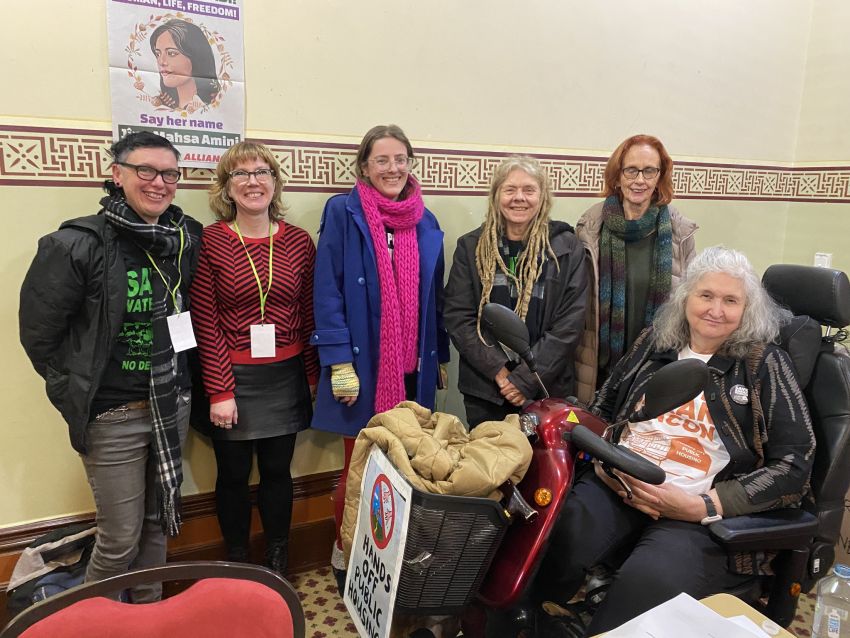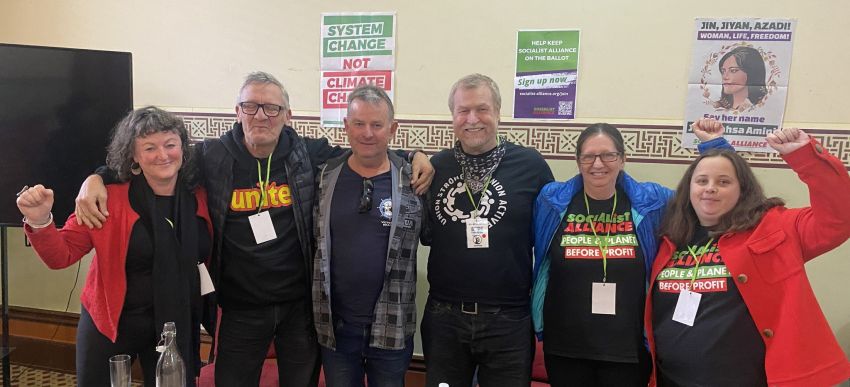
The Ecosocialism 2023: A World Beyond Capitalism conference, hosted by Green Left and co-sponsored by Socialist Alliance, drew hundreds to Victorian Trades Hall over July 1–2.
Conference organiser Jacob Andrewartha told Green Left that one of its purposes was to “provide a platform for the voices of peace, justice and ecological sustainability” from across the region. Close to 300 people took part.
Socialists from India, Pakistan, the Philippines, Malaysia and Singapore spoke on their struggles to oppose militarism, fight for climate justice and the challenges they face in convincing more people to join their project.
A highlight was Japanese Marxist Kohei Saito’s session on degrowth communism. The author of Marx in the Anthropocene spoke about his examination of Marx’s unpublished writings and made a case that Marx, in his later life, was beginning to conceptualise communism as a fundamental break from capitalism and its pursuit of unlimited growth.
Saito suggested Marx was beginning to engage with the idea of a “steady-state economy” and the slowing down of social production. Saito said that, in the age of the anthropocene, this will be the only chance to create an ecologically sustainable society.
During discussion, Anitra Nelson, an Honorary Principal Fellow at the Informal Urbanism Research Hub at the University of Melbourne, asked Kohei to describe degrowth initiatives. Jeff Sparrow, author of Crimes against Nature: Capitalism and Global Heating, challenged the degrowth notion, arguing that any transition to a society organised around use values, rather than exchange values, would need to rethink the degrowth versus growth paradigm. He asked whether it would be preferable to simply talk about communism.
Peter Boyle, from Socialist Alliance, said ecology was not a secondary consideration for Marx: it was at the core of his analysis of capitalism. He praised Saito for reviving and popularising Marx’s vision of a post-capitalist society that could deliver both a new kind of abundance and human liberation within an ecologically sustainable economy.
A “Housing as a Human Right” workshop linked public housing activists from Gadi/Sydney and Naarm who spoke about the campaigns to stop the destruction of Waterloo Estate in New South Wales and Barak Beacon Estate in Port Melbourne.


Other workshops covered the development of artificial intelligence, imperialism in the 21st century, the origins of women’s oppression, the Kurdish national liberation struggle and the fight for First Nations sovereignty.
Clifton D’Rozario, from the Communist Party of India (Marxist-Leninist) Liberation, spoke about how his party is responding to Narendra Modi’s Bharatiya Janata Party (BJP) government’s threats to democracy and the environment.
D’Rozario argued that the BJP is not just another capitalist party, but a “fascist regime” and his party is calling for “all-out resistance to this growing fascist offensive and its consolidation”. Discussion also centered around how the progressive Indian diaspora and, in particular, the Humanism Project in Melbourne, can help the struggle.
Djab Wurrung Gunnai Gunditjmara Senator Lidia Thorpe spoke alongside Joel Shackleton, a Gunditjmara man and Koori Construction, Forestry, Mining and Energy Union organiser. Thorpe said the Blak sovereign movement is alive “and we don’t want to be assimilated into the colonial document that has oppressed us for 200 years”.
She took questions on the Voice to Parliament and said she would not campaign for “No”, but would continue to speak out with First Nations struggles on the ground and in the streets.
Farooq Tariq, President of the Harooq Khalq Party in Pakistan, Liam Flenady from the Queensland Greens and Susan Price, co-editor of Green Left, closed the conference with their thoughts on revolutionary change in a climate emergency.
Reflecting on the conference, Kokila Annamalai, co-founder of Transformative Justice Collective and Workers Make Possible in Singapore, told Green Left it was an “affirmation of our shared, deep longing for a world of justice, freedom and dignity for all people”. She said it celebrated the “courage, incredible hard work and irrepressible spirit of leftist organisers, intellectuals and activists from around the world”.
[A playlist of the conference YouTube videos is here.]